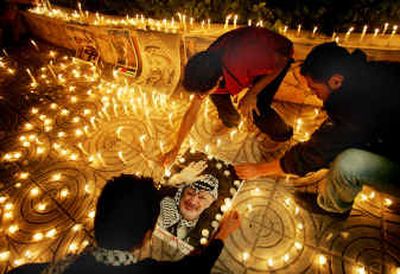Palestinians preparing for Arafat’s death

PARIS – A comatose Yasser Arafat clung to life Tuesday after suffering another downturn, his major organs still functioning but his survival dependent “on the will of God,” the Palestinian foreign minister said.
Palestinian leaders made preparations for Arafat’s eventual death. They said they would bury Arafat at his sandbagged headquarters in the West Bank and turn the site into a shrine.
But the 75-year-old leader, whose condition has steadily worsened since he was flown to a military hospital outside Paris on Oct. 29, would not be removed from life support, Palestinian Foreign Minister Nabil Shaath said.
Today, Taissir Dayut Tamimi, a top Islamic cleric, was rushing to Arafat’s hospital bedside. Shaath called Tamimi “a very close friend” of Arafat and said that “we think having a religious person beside him in these difficult moments is relevant.”
He dismissed speculation that Tamimi, head of the Islamic court in the West Bank and Gaza Strip, could advise on removing Arafat from life support. “No mufti in the world has the right to do that,” Shaath said.
Shaath discounted reports that Arafat’s organs had failed.
“His brain, his heart and his lungs are still functioning and he is alive,” Shaath said after he and other Palestinian officials met with Arafat’s doctors, his wife and French President Jacques Chirac. “He will live or die depending on his body’s ability to resist and on the will of God.”
Shaath’s remarks at a news conference underlined that the Palestinian leadership was now in control of information about Arafat after days of confusing and often conflicting reports about his undisclosed illness. Palestinian officials had been denied access by Arafat’s wife, Suha, who used France’s strict privacy laws that give authority to the family.
Shaath also tried to dispel concerns about the possibility for chaos in the West Bank and Gaza Strip in the event of Arafat’s death and said the leadership transition would be smooth.
“What I would say is that on the political level, our government is functioning,” he said.
On a visit to Mexico, U.S. Secretary of State Colin Powell said the Bush administration was ready to engage with the emerging Palestinian leadership to make progress toward establishing a Palestinian state at peace with Israel.
The Palestinian deputy Parliament speaker, Hassan Khreishe, told the Associated Press that leaders decided Arafat should be buried at his West Bank headquarters, known as the Muqata. Arafat was cooped up in his battered offices by Israel’s army for nearly three years, and the site has become a symbol to Palestinians of their resistance to Israeli occupation.
“We formed a committee to handle Arafat’s burial in the event of his death, and the burial will be in the Muqata,” Khreishe said.
The decision was likely to head off a fight with Israel’s government over a grave site for Arafat. Palestinian officials had wanted to bury their leader in Jerusalem, which they claim as the capital of their envisioned state, but Israel refused.
A top aide to Israeli Prime Minister Ariel Sharon, Asaf Shariv, said the government would consider Ramallah as a burial site.
Palestinian officials said Egypt’s government offered late Tuesday to hold a memorial service for Arafat in Cairo before a Ramallah burial and they said the proposal was being considered.
A Palestinian official stressed that a Ramallah grave would only be considered temporary, with the ultimate goal remaining burial in Jerusalem. The official said the decision to create a burial shrine at the Muqata was made by Prime Minister Ahmed Qureia and Mahmoud Abbas, the caretaker leaders during Arafat’s illness.
Qureia has assumed some emergency financial and administrative powers and Abbas has presided at meetings of the PLO’s executive committee.
A top Palestinian official, Tayeb Abdel Rahim, said Arafat suffered a brain hemorrhage Monday night, but Shaath said he could not confirm that and said scans showed Arafat’s “brain remains sound.” Such bleeding often causes brain damage.